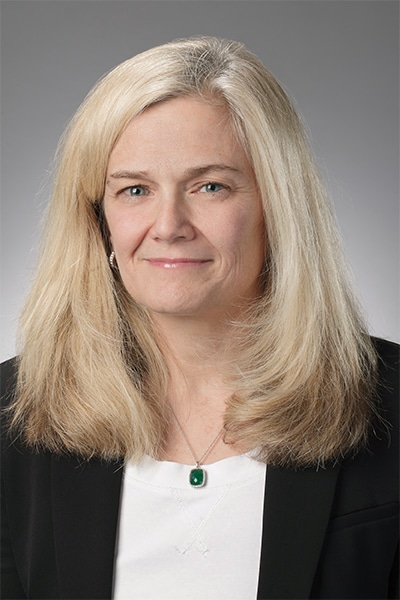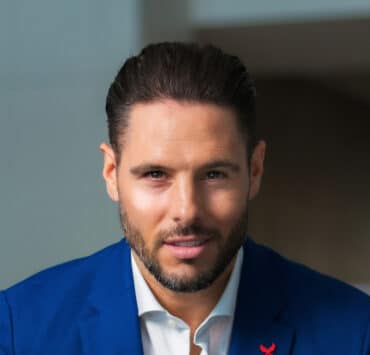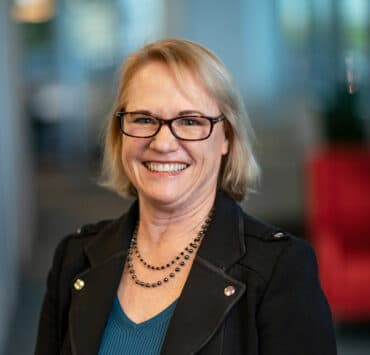|
Getting your Trinity Audio player ready...
|
Amy Hughes always wanted to be a lawyer, but for years, she thought that just meant arguing—a notion that made her avoid pursuing a law career right out of college. But on her unconventional path to law, she says, she learned that quite the opposite was true.
“It’s really about finding a path to agreement, commonality and consensus, looking at things from someone else’s perspective and figuring out a way where both sides win,” says Hughes. Today she’s senior legal counsel for Weyerhaeuser, a company that manages millions of acres of forests and manufactures wood products. Their land is used for sustainably growing trees, recreation, conservation, and renewable energy purposes, among other uses.
One of Hughes’s responsibilities is helping the company’s foresters and land use managers navigate legal issues tied to their work. That includes issues related to easements and property lines and agreements with neighbors. She also supports legal matters related to real estate purchases and sales. That work necessitates a very “practical way of lawyering,” which Hughes says she learned from her mentors over the years.

“It’s not always about being right. The goal is to listen and try to understand the other side and to not fight for the sake of fighting something,” she says. “And to acknowledge when the other side makes a fair point.”
In part, she says, this mentality stemmed from her experiences teaching English to nonnative speakers. Hughes, who has a Bachelor of Arts degree in German, taught English in Austria for two years after graduating from college. When she came back to the US, she earned a Master of Arts in teaching English to speakers of other languages and then taught at Michigan State University and the University of Montana. She says those experiences taught her how to communicate simply and effectively: skills that proved vital for her legal career.
“A lot of lawyers get caught up in using particular words for the sake of sounding smart, but I just don’t agree with that approach. It’s about simplicity and how to get to the nuts and bolts of what we want to say.”
With teaching experience and a master’s degree under her belt, she came to a crossroads. Hughes, then in her thirties, had to decide whether to further her education with a doctorate degree or to head in a different direction. It was then that she realized her interest in law was something she couldn’t shake, and she enrolled in law school at Northwestern University in the Chicago area.
Early in her law career, she discovered a passion for being a transactional lawyer while working at a firm as a first-year associate. There, Hughes was assigned to a real estate group and found that it was the perfect fit for her: she appreciated that real estate was concrete and practical. Her range of interests grew as she worked for other firms and for Starbucks as corporate counsel, deepening her knowledge about drafting contracts, working with clients, and negotiating. Those roles set the stage for an opportunity to work at Weyerhaeuser in a role that allowed her to unite her passions: the outdoors, real estate, and transactional law.
“I was kind of mesmerized—and still am—to work for one of the largest private landowners in the country,” she says. “As a real estate lawyer, our land base is fascinating.”
One initiative that Hughes is proud her company is undertaking is tied to its diversity, equity, and inclusion efforts. This year, the legal department will be recognizing one of its outside counsel firms for their work in making the legal profession more equitable. “While giving an award may not change things, it’s one step forward, and it’s fostering a conversation about issues that are important to me,” she says.
Each day at work brings a unique challenge, but Hughes is most excited to figure out how she can best help her colleagues and her company find the right solutions. She’s drawn to kayaking, cycling, and hiking, and likens that last activity to the teamwork she facilitates at work. To ascend a mountain together, a team has to accommodate each other’s strengths and weaknesses. A similar process plays out when the company determines which properties to purchase or sell.
“Everyone knows different aspects of the company, so a forester can go on-site and look at it and understand the quality of the trees that are there, someone else can estimate what the value of those are, and a real estate lawyer can consider the legal assets and liabilities of purchasing a property,” she says. “Team really is about everyone understanding their strengths, bringing those to the table, and working together.”
***
For more than eighty years, companies that develop and employ natural resources have called on Schwabe for all their legal needs.


